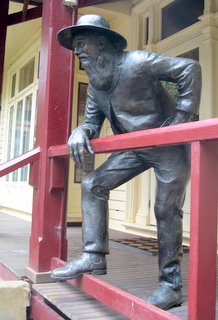
Andrew Barton "Banjo" Paterson, was an Australian bush poet, journalist and author, widely considered one of the greatest writers of Australia's colonial period.
"Clancy of the Overflow" is a famous Australian poem written by Banjo Paterson and first published in The Bulletin, an Australian news magazine, on 21 December 1889. The poem is typical of Paterson, offering a romantic view of rural life, and is one of his best-known works.

"The Man From Ironbark" is a poem by Australian bush poet Banjo Paterson. It is written in the iambic heptameter.
"Up The Country" is a popular poem by iconic Australian writer and poet Henry Lawson. It was first published in The Bulletin magazine on 9 July 1892, under the title "Borderland." Its publication marked the start of the Bulletin Debate, a series of poems by both Lawson and Andrew Barton "Banjo" Paterson asserting contrasting views of the true nature of life in the Australian bush.
In Defence of the Bush is a popular poem by Australian writer and poet Andrew Barton "Banjo" Paterson. It was first published in The Bulletin magazine on 23 July 1892 in reply to fellow poet Henry Lawson's poem, Up The Country. Paterson's rebuttal sparked the Bulletin Debate, a series of poems by both Lawson and Paterson about the true nature of life in the Australian bush.
The City Bushman is a poem by iconic Australian writer and poet Henry Lawson. It was first published in The Bulletin magazine on 6 August 1892, under the title In Answer to "Banjo", and Otherwise. It was the fourth work in the Bulletin Debate, a series of poems by both Lawson and Andrew Barton "Banjo" Paterson, and others, about the true nature of life in the Australian bush.
In Answer to Various Bards is a poem by Australian writer and poet Andrew Barton "Banjo" Paterson. It was first published in The Bulletin magazine on 1 October 1892 in reply to fellow poet Henry Lawson's poem, In Answer to "Banjo", and Otherwise.
Saltbush Bill is a humorous poem by Australian writer and poet Andrew Barton "Banjo" Paterson. It was first published in The Bulletin magazine on 15 December 1894, the Christmas issue of that publication.
Saltbush Bill's Gamecock is a humorous poem by Australian writer and poet Andrew Barton "Banjo" Paterson. It was first published in Brooks's Australian Xmas Annual Volume 1 1898.

Saltbush Bill's Second Fight is a humorous poem by Australian writer and poet Andrew Barton "Banjo" Paterson. It was first published in The Antipodean in 1897.
Saltbush Bill on the Patriarchs is a humorous poem by Australian writer and poet Andrew Barton "Banjo" Paterson. It was first published in The Evening News on 19 December 1903.
Saltbush Bill, J.P. is a humorous poem by Australian writer and poet Andrew Barton "Banjo" Paterson. It was first published in The Evening News on 16 December 1905.
A Bush Christening is a humorous poem by Australian writer and poet Andrew Barton "Banjo" Paterson. It was first published in The Bulletin magazine on 16 December 1893, the Christmas issue of that publication. It has been called "a rollicking account of how the traditional pre-occupations, whisky and religion, come together".
Rio Grande's Last Race is a racing poem by Australian writer and poet Andrew Barton "Banjo" Paterson. It was first published in the London Sketch magazine on 16 December 1896. It was later published as the title poem for Paterson's second poetry collection, Rio Grande's Last Race and Other Verses, in 1902.
"A Bushman's Song" (1892) is a poem by Australian poet A. B. Paterson.
"Bullocky" (1944) is a poem by Australian poet Judith Wright.
"Nationality" is a poem by Australian poet Mary Gilmore. It was first published in Australian Poetry 1942, edited by Robert D. Fitzgerald in 1942, and later in the poet's collection Selected Verse, and other Australian poetry anthologies.
"The Orange Tree" is a poem by Australian poet John Shaw Neilson. It was first published in The Bookfellow on 15 February 1921, and later in the poet's collections and other Australian poetry anthologies.
"The Beautiful Squatter" (1845) is a poem by Australian poet Charles Harpur.
"Middleton's Rouseabout" is a poem by Australian poet Henry Lawson. It was first published in The Freeman's Journal on 8 March 1890, and later in the poet's collections and other Australian poetry anthologies.


